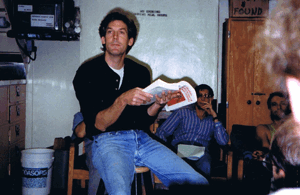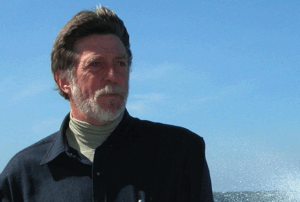The Poetry of the Ocean
Air Date: Week of February 11, 2011

One of John Delaney's favorite haikus is by the 17th-century Japanese poet Matsuo Basho. (Ed Jansen)
You might think that science and poetry are, well, like oil and water. But Oceanography Professor John Delaney of the University of Washington is on a mission to blend science and poetry to achieve a deeper understanding of our planet. Reporter Ari Daniel Shapiro reports.
Transcript
GELLERMAN: The language of the scientist is factual. The words of the poet: metaphorical. But letÂ’s not be so strictly categorical - for rhyme and reason fused can be formidable. Oceanographer John Delaney waxes scientific and poetic at the University of Washington. Reporter Ari Daniel Shapiro has - his chapter, and verse.
SHAPIRO: Last year at a workshop for the Ocean Observatories Initiative in Baltimore, John Delaney huddled with Susumu Honjo during an evening reception. Honjo is an oceanographer at the Woods Hole Oceanographic Institution. He and Delaney were discussing a haiku written by Matsuo Basho, a 17th-century Japanese poet.

One of John Delaney's favorite haikus is by the 17th-century Japanese poet Matsuo Basho.
(Photo: Ed Jansen)
[CROWD TALKING INCOHERENTLY IN BACKGROUND]
HONJO: But let’s go with it, ok? Araumiya.
DELANEY: Araumiya.
HONJO: Ok, there are two things: intonation, which is go up and down very slightly…
SHAPIRO: This is one of Delaney’s favorite haikus.
HONJO: And also important thing is thereÂ’s a pause. If you go without a pause, it doesnÂ’t mean too much. If you leave the pause too long, it looks like you are hesitating. And, you generally learn itÂ…
DELANEY: (Laughs.)Â…by doing it.
HONJO: By doing it. Ok: Araumiya
Sado ni yokotau
Amanogawa
DELANEY: Araumiya
Sado ni yokotau
Amanogawa
HONJO: Good! Perfect, perfect, perfect, perfect.
SHAPIRO: The haiku, it means: Turbulent the sea
Stretching across to Sado Island,
The Milky Way.
HONJO: For us, for many people, that really symbolized not only the Earth, not only the water, not only the dark sky, but itÂ’s a whole universe!
DELANEY: Absolutely. And another way of thinking about it, “Turbulent the sea” means the ocean is very disturbed. Big waves. Breaking on the beach. And yet, referring to the Milky Way stretching across to Sado, it’s quite clear that the clouds have passed away, so there’s no storm at the moment. And yet the sea has a memory and it’s still turbulent. And so in 17 syllables in Japanese, Basho captured the absolute essence of the moment.

Poet Michael Collier. Poetry readings have become a ritual aboard Delaney's research cruises.
(Photo: Veronique Robigou)
SHAPIRO: For Delaney, the ocean is both a source of intellectual curiosity and emotional possibility. Science speaks to the intellect, he says, whereas poetry speaks to both the intellect and the emotion.
Michael Collier is a professor of English and creative writing at the University of Maryland College Park. HeÂ’s a poet too, and back in 1991, Delaney invited Collier to join him aboard the Atlantis II on one of his research cruises.
COLLIER: John just had this sense that having a poet onboard would bring another kind of element, a different kind of way of looking at the world.
SHAPIRO: Collier’s time aboard inspired him to write two poems later – one called “Fathom and league” and the other “Pax geologica.” He also read his poetry during the cruise, and it was the beginning of a tradition. On every research cruise since, one night has been devoted to poetry. Scientists, students and crew gather in the library to read aloud their own poetry or the poems of others. It’s become one of the best-attended and most eagerly anticipated events of every cruise.
Naturally, there’s also a lot of science happening onboard these cruises. For almost two decades, Delaney’s been pushing for a new kind of ocean science – a way of being there in the volume of the ocean without actually being there. It involves lighting up the ocean with an extensive network of sensors and semi-autonomous robots that can be reprogrammed from shore via high speed optical networks.
DELANEY: This Ocean Observatory Initiative will have thousands of sensors distributed through the volume of the ocean that will ever be on guard. I mean, 24/7/365 for decades, weÂ’ll be measuring the ocean from the inside out all the time.
SHAPIRO: This vision - it received funding from the National Science Foundation in September 2009. And itÂ’s only three years away from becoming a reality where these sensors monitor the physics, chemistry and biology of the ocean and seafloor in many locations across the world.
DELANEY: Humans will be intimately involved and tied to the oceans on a routine, regular basis in ways that we can’t even imagine right now. We will have the capacity to detect and track major events like a gigantic storm, or an erupting volcano, or migrating blue whales, or fish stock migration patterns, or for that matter – it could easily be big earthquakes and the tsunamis they generate. The more we know, the more wisely we can use and protect ourselves from the ocean.
SHAPIRO: This vision - it represents a democratization of science since these observatories will relay their data about the worldÂ’s ocean to anyone with an Internet connection. To scientists and, for that matter, poets too. On that research cruise almost 20 years ago, poet Michael Collier came to realize the connections between science and poetry.
COLLIER: One of the big connections is just experimenting. Poetry is experimenting with language, and science is experimenting with, you know, concepts. And then, also, theyÂ’re both very powerful forms of human inquiry and they both lead to different kinds of truth.

John Delaney finds poetic inspiration gazing at the ocean during a research cruises.
SHAPIRO: Delaney shares his love of poetry with other scientists too. Take Margaret Leinen, the associate provost at Florida Atlantic University. She met Delaney on a research cruise back in the early 80s, and theyÂ’ve stayed in touch ever since.
LEINEN: Whenever he is in town, IÂ’ve often got something new that I have to read to him.
SHAPIRO: For exampleÂ…
LEINEN: This is a poem by Ted Koozer who won the Pulitzer Prize for poetry. This poem is called “A Jar of Buttons.”
This is a core sample
from the floor of the Sea of Mending,
a cylinder packed with shells
that over many years
sank through fathoms of shirts –
pearl buttons, blue buttons –
and settled together
beneath waves of perseverance,
an ocean upon which
generations of women set forth,
under the sails of gingham curtains,
and, seated side by side
on decks sometimes salted by tears,
made small but important repairs.
SHAPIRO: For John Delaney, the ocean is full of mystery. And ocean observatories are a powerful way of weaving together the scientific and aesthetic threads that make up the fabric of our global ocean, and then streaming it all back to shore for everyone to absorb, read, pore over, and find meaningÂ…whatever their specific focus may be.
DELANEY: It gives us all the opportunity to experiment, to innovate, to develop novel approaches to studying the global ocean, which is really our life support system on the planet. ItÂ’s nothing more and nothing less. ItÂ’s the complexity that is going to be the biggest nut for us to crack. And itÂ’s not gonna yield easily to casual effort. ItÂ’s gonna be a major, major challenge for us to get there.
SHAPIRO: For Living on Earth, IÂ’m Ari Daniel Shapiro.
GELLERMAN: Our story about the poetry of the sea comes to us courtesy of Ocean Gazing Podcast. ItÂ’s produced by the Centers for Ocean Sciences Education Excellence, with support from the National Science Foundation. For more information on Ocean Gazing, take a gander at our website loe.org.
[MUSIC: Jeannie Bryson “Poetry Man” from Deja Blue (Koch Jazz 2001).]
Links
Living on Earth wants to hear from you!
Living on Earth
62 Calef Highway, Suite 212
Lee, NH 03861
Telephone: 617-287-4121
E-mail: comments@loe.org
Newsletter [Click here]
Donate to Living on Earth!
Living on Earth is an independent media program and relies entirely on contributions from listeners and institutions supporting public service. Please donate now to preserve an independent environmental voice.
NewsletterLiving on Earth offers a weekly delivery of the show's rundown to your mailbox. Sign up for our newsletter today!
 Sailors For The Sea: Be the change you want to sea.
Sailors For The Sea: Be the change you want to sea.
 The Grantham Foundation for the Protection of the Environment: Committed to protecting and improving the health of the global environment.
The Grantham Foundation for the Protection of the Environment: Committed to protecting and improving the health of the global environment.
 Contribute to Living on Earth and receive, as our gift to you, an archival print of one of Mark Seth Lender's extraordinary wildlife photographs. Follow the link to see Mark's current collection of photographs.
Contribute to Living on Earth and receive, as our gift to you, an archival print of one of Mark Seth Lender's extraordinary wildlife photographs. Follow the link to see Mark's current collection of photographs.
 Buy a signed copy of Mark Seth Lender's book Smeagull the Seagull & support Living on Earth
Buy a signed copy of Mark Seth Lender's book Smeagull the Seagull & support Living on Earth

